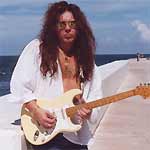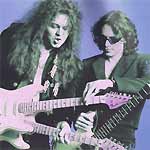Itís nearly noon. My phone interview with Yngwie is supposed to happen at 1pm. One hour away, I prepare for my ritual of looking over my notes and testing my ever-reliable recorder. Plenty of time. However, thereís this guy named Murphy that has plagued me for the majority of 2003, and seems to have taken up permanent residence with me ever since. He emerges once again; the oh-so dependable recorder is not working. I frantically push buttons, replace batteries and try sticking things in itónothing works.
One hour, and the self-proclaimed ďfastest guitarist on the planetĒ will be calling me. This wouldnít happen when Iím on assignment interviewing the local guy in the pub with missing teeth who wants to make me his girlfriendÖ Oh no. That toothless guyís voice, ďHEY BAYBEEEE!Ē will be resonating (in my head) and on one of my cassette tapes forever.
Frantic, I rush to the nearest Radio Shack and wind up in line behind the old lady wanting to test EVERYTHING in the placeóto which she ultimately ends up buying NOTHING. Uuuugh! I finally make my purchase of $79.00, rush back home, plug the new recorder in, and it DOESNíT work. Jesus. Ten minutes to interview time.
Do I just tell Yngwie that I canít interview him? Who would do that? I look around the room, consider holding the recorder up to the receiving end of the phoneówhich doesnít really seem like a viable solution, and I ultimately end up using two phones with the recorder jimmied on top of one end with black tape. It works.
The phone rings, and my caller ID says ďYngwie Malmsteen,Ē which in a guilty pleasuring kind of way, makes up for all the troubles I had earlierÖ(Ďcause it is kind of cool having Yngwieís name on your caller ID!) Thankfully, my interview is completed without any other complications or interference from Mr. Murphy. Bastard.
KNAC.COM: I want to start from the beginningÖ I hear you were quite a rebel in your schoolboy years.
 MALMSTEEN: [Laughs] Yeah. I mean, to be honest with you, when I grew up, Sweden was a country where it was quasi-socialists/communists. You werenít meant to stand out. You werenít meant to be anybody special. You were only meant to conform and do what you were told. And I couldnít deal with that. I often reflect on that, and I say, ďI wonder why I was born in Sweden?Ē Because I donít look Swedish, I donít act Swedish and I donít like cold weather. It resulted in, well, me being a long-hair, and wearing what no one else was, and I got into a few fights in school. But it was no big deal really; I think itís kind of a normal thing.
MALMSTEEN: [Laughs] Yeah. I mean, to be honest with you, when I grew up, Sweden was a country where it was quasi-socialists/communists. You werenít meant to stand out. You werenít meant to be anybody special. You were only meant to conform and do what you were told. And I couldnít deal with that. I often reflect on that, and I say, ďI wonder why I was born in Sweden?Ē Because I donít look Swedish, I donít act Swedish and I donít like cold weather. It resulted in, well, me being a long-hair, and wearing what no one else was, and I got into a few fights in school. But it was no big deal really; I think itís kind of a normal thing.
KNAC.COM: You began playing after hearing of Jimi Hendrixís death, and then were later influenced by Ritchie Blackmore, but I find that your stylings are so much diverse from both of those artists.
MALMSTEEN: You see, what happened was, my older brother and older sister were extremely accomplished musicians. My Mother sang in a choir, she was a lead singer in a jazz band, classical choir and my Father, which I wasnít really too close with, was a guitar player, my Uncle was an opera singer, my Auntís an opera singerÖ so obviously I was completely surrounded around music all the time. I was the youngest kid in the family, and I got my first guitar when I was five. I really didnít want to have anything to do with it at the time. And then eventually, September 18, 1970, they showed Jimi Hendrix setting his guitar on fire on the news, and said that ďToday rock star Jimi Hendrix died,Ē whatever. And of course it was sad, sad news, but the only thing as a seven-year-old kid I saw was this guy setting his guitar on fireÖ and I thought it was the coolest thing Iíd ever seen. And so I said, ďOh, I better start playing!Ē So I took the guitar off the wall that I was given, and I started playing at that very moment. And my older sister is guilty of all of this. Because she would buy all the records, and I would listen to them. Everything ranging from Weather Report to Frank Zappa. Whatever she brought home. And then on my eighth birthday she gave me Deep Purpleís Fireball. And then, that was it. I knew what my life was going to be.
KNAC.COM: Well, God bless your sister!
MALMSTEEN: My sister, I love her so much. Sheís responsible for all of this. And even more so, because once I learned how to play all the things that Blackmore did, and by the time I was ten years old, I could play note for note everything he did. I was a pretty crazy little kid. I would play until I fell asleep and I would wake-up and my guitar was still on me, and I would just carry on. And school, I didnít give a fuck about that. So she brought home an album by Genesis, called Selling England by the Pound, which was the Peter Gabriel era. They had all these chord progressions, which I found very intriguing. Because Purple, Zeppelin, Sabbath and all that, were all blues based. And thatís all great, but I wanted to go somewhere else. So in listening to Genesis, I realized that my Mother had around four-hundred classical records: Bach, Beethoven, Tchaikovsky. And I started going into those chord progressions, and pedal notes and arpeggios and stuff like that.
KNAC.COM: You have a lot of classical ambiances in your style.
MALMSTEEN: Yeah. Eventually I saw another cat on TV, and that was the breaking moment for me. I was about twelve or thirteen. It was a Russian violinist called Gidon Kremer. And I said, I ainít going to listen to the guitar players no more! I want to go there! And instead of playing violin, because Iíd already gotten so good on the guitar, I applied those techniques to the guitar. Hence my style.
KNAC.COM: Do you feel like you were the original guitarist to quite literally fly up and down the neck of a guitar?
 MALMSTEEN: The thing is, when you play rock guitar, and, God bless rock guitar, I love all of them, but to me itís kind of limiting, you know? Because the pentatonic scale only has five notes, and youíre within that realm and you canít really go much further from there. So you start doing chromatics and diminished and harmonic minors, you can go much further. If you bring in linear notes and linear patterns and arpeggios and start thinking in the base notes in thirds, and itís quite complicated, but it is so much more intriguing to me. And it gives me much more to do that. Although I still love the blues and I still play the blues and I always will, itís not enough.
MALMSTEEN: The thing is, when you play rock guitar, and, God bless rock guitar, I love all of them, but to me itís kind of limiting, you know? Because the pentatonic scale only has five notes, and youíre within that realm and you canít really go much further from there. So you start doing chromatics and diminished and harmonic minors, you can go much further. If you bring in linear notes and linear patterns and arpeggios and start thinking in the base notes in thirds, and itís quite complicated, but it is so much more intriguing to me. And it gives me much more to do that. Although I still love the blues and I still play the blues and I always will, itís not enough.
KNAC.COM: Do you kind of feel pigeonholed sometimes though, with your signature style, where youíre perhaps not able to break-out and do any other style other than what people expect from you?
MALMSTEEN: Pigeonholed. Letís look at it in the respect of logic. You have AC/DC, you have the Rolling Stones, BB King, Judas Priest, Aerosmith, Black Sabbath, and the list goes on and on and on. These guys all have a sound that you know right away is them. God bless them for it. If it ainít broke, donít fix it. To me, every time I hear people say, ĎIt still sounds like Yngwie,Ē well, you bet it does. It fuckiní will all the time. So get used to it. [Laughs].
KNAC.COM: I know when you first became popular, peopleís jaws literally dropped because of how fast you played your guitar. Do you think youíre still the fastest guitarist in the world?
MALMSTEEN: Actually, technically Iím better now than ever. Iím a tennis freak, too. I play tennis every day.
KNAC.COM: Are you as fast with a racket as you are with the guitar?
MALMSTEEN: No, I just love the game. I was lucky enough to find a piece of property that had a private tennis court. I watch the Australian Open and Iím glued to the TV. So, what Iím trying to say is that twenty years ago, when I came to the States, I was really hungry. And I just did what I knew how to do. I didnít try to do anything that I didnít know how to do. And thatís sort of the same thing that Iím doing now.
KNAC.COM: You just completed the G3 tour with Satriani and Vai, which is never a disappointment. You seemed to be having a great time. I saw you wandering about after the show with your drummer who seemed very friendly.
MALMSTEEN: Yeah, well heís the type that says Ďhií to everybody. [Laughs]
KNAC.COM: I kind of got that impression [Laughing].
MALMSTEEN: Heís kind of new. Heís a great guy though and a great drummer. Heís never been on any big tours before. Heís from a small village in Sweden.
 KNAC.COM: It was cute. I didnít think that he had his tour ďlegsĒ yet though.
KNAC.COM: It was cute. I didnít think that he had his tour ďlegsĒ yet though.
MALMSTEEN: He needs to work on it, definitely. [Laughs] I play tennis with him everyday. In fact, weíre in the studio right now recording another album. Iíve never really stopped to be honest.
KNAC.COM: I know. Youíre discography is just huge. Iím kind of disappointed actually, because a lot of it was never released in the U.S.
MALMSTEEN: It was a combination of really bad management and the trends. The Ď90s were dark and the Ď80s were great. But then again, I can carry on a triple platinum in Japan every year and most everywhere outside the States. But I didnít give up. It seems like now since Iíve been signed up with Sony/Epic, things are looking up and up. Iím very pleased. There are so many things going on though. I donít even go on the Internet. Iím completely old-fashioned. I make my living playing a piece of wood. I refuse to drive a car unless it has a manual stick shift and Iím just like that.
KNAC.COM: Do you ever get disappointed with how fickle Americanís can be?
MALMSTEEN: No, no, no. I would like to point that out right now. The United States of America, 280 million people are not all buying Britney Spears and rap albums. On the G3 tour, I realized that more than ever, that what the media portrays is only what they want to show you. Itís not people want. So, keep your freak flag high, baby! Thereís someone out there whoís going to love what you do. If you start being a trend, forget about it. Longevity is the key. Itís the name of the game.
KNAC.COM: As long as youíre making a living at it, and youíre happy.
MALMSTEEN: Iím telling you, there were kids from twelve up to sixty years old at every G3 show. We played 22 thousand seats in Toronto and Montreal and in New York. This is something thatís as American as apple pie. Fender Stratocaster, well, Iím the only one playing a strat, but the Fender Stratocaster just turned fifty this year.
KNAC.COM: Do you play strictly Fender?
MALMSTEEN: When it comes down to being on stage and recording in the studio, thatís it. But I have over 200 guitars. I have Gibsonís, I have sitars, and I have acoustics, loads of things.
KNAC.COM: Did you buy your sitars from India?
MALMSTEEN: Actually, I bought them in EnglandÖ and I bought one in Miami, too.
 KNAC.COM: I would love to hear you play sitar. You should bring that out with you when you tour.
KNAC.COM: I would love to hear you play sitar. You should bring that out with you when you tour.
MALMSTEEN: I play cello, too. I play them on some albums. The Attack album, I even sing on, too.
KNAC.COM: I heard you sing on the G3 tour.
MALMSTEEN: Yeah, I do some blues stuff.
KNAC.COM: It would be cool to see you bring several instruments out on a tour to show your diversity. So are there any new guitar players out there knocking your socks off?
MALMSTEEN: Well, Iím sure there are a lot of good players out there. I first of all, donít even have the time to check any out. I work on music all the time -- I have a studio in my house and all over the place, and when Iím not making music, Iím a movie freak. So, I donít go out very much. But I was driving down the street the other day, and I heard this new band called Evanescence. They were really good. It was tasty. Itís been a long time since Iíve turned on the radio and heard something that I really loved.
KNAC.COM: Was it everything you expected, when you left Sweden in Ď82 to come here and play? Did you ever at a point in your career think of giving it up?
MALMSTEEN: It was never any question to give it up. Never. But I can tell you this much, I came here with one guitar and an extra pair of pants and my goal was to not have to work in McDonaldís. I didnít have the expectation though to live the way I do, have what I have and the respect and recognition that I have.
KNAC.COM: Alcatraz had some pretty good popularity early onÖ Is that when you felt like you had officially made it?
MALMSTEEN: It was a good band. And no, it wasnít then. Iíll tell you what the funniest thing is -- I came to the States and I got picked up by these guys called Steeler. And I was so different from them. I looked like a hippie. Long hair, a mustache. These guys had this black hair that was all teased up to the roof, and Iím like, ďOkay, I can get used to this.Ē And the first show, there was thirty people. And the next show we did, I looked out the window from the Troubadour, and it was like a snake of people four blocks long. But in one show, thirty people said, ďYou should check out this little kid from Sweden.Ē And it was really bizarre, because it happened so fast. Then all of a sudden, I got these offers from Lita Ford, OzzyÖ from all sorts of people. And I had decided to do it with Graham Bonnet, because I had the option to write songs. And Iíd always been a songwriter.
KNAC.COM: And Graham had some pretty close ties to Blackmore, which kind of brings you back to your original influence.
MALMSTEEN: But that wasnít the reason. Personally, I think the record Graham did with Blackmore wasnít exactly the best record. The reason I chose to do it, was because Graham didnít have a direction, didnít have a sound, didnít have any songs, so I could come in and put my ten cents worth in. And they all accepted it. So that felt good to me. With Steeler, I hardly wrote anything, other than a couple of songs maybe. Iíve been playing in bands since I was ten years old. I was really rocking Stockholm. I remember my first break actually. Iíll never forget it. It was a festival in Sweden called WoodStockholm. There were forty bands playing and I was on the bill, but there were much bigger bands playing. And the next day I went down to the 7-11, or whatever it was, and I see this picture on the front page of this paperÖ and I thought, this is bizarre, I know who that is -- it was me! It freaked me out. So I went into the store and bought every paper they had. The headline read:
ďRising Force, Swedenís Deep Purple.Ē I was very excited about that. And that was in 1980. 1983 is when I came to the States and started rolling really good.
KNAC.COM: Do you still scallop your fretboards?
MALMSTEEN: Yeah.
KNAC.COM: Is that on all of your guitars?
MALMSTEEN: Well, all of my strats. I donít do it to my Les Paul, or my bass.
KNAC.COM: Whatís your rig of choice?
MALMSTEEN: Can there be more than one?
 KNAC.COM: Rhetorical? I have a personal favorite, but I bet itís different than yours.
KNAC.COM: Rhetorical? I have a personal favorite, but I bet itís different than yours.
MALMSTEEN: Marshall.
KNAC.COM: I was thinking of Mesa Boogie, which would be my choice.
MALMSTEEN: [Scoffs] No, no, noÖ Iíve been using Marshallís since 1975. There can only be one. But I use the old ones, you know. They donít have master volume on them. You canít play them quiet. Eleven only.
KNAC.COM: Do you have neighbors?
MALMSTEEN: No I donít, I actually have three and a half acres. Iím right smack in the middle of the city, but I managed to get this place.
KNAC.COM: You donít use a lot of effects, do you?
MALMSTEEN: No, actually I donít use anything. But I do on stage, I use delays. So I can play counterpoints. Itís like ďbum, bum, bum, bumÖĒ almost like, row, row, row your boat. But thatís the concept of it. I kind of look at electric guitar like an acoustic instrument, even though itís not. Like a violin, you know. Instead of relying on effects, I have to do it with my hands.
KNAC.COM: Speaking of your hand, you had a nearly fatal accident back in í87 which nearly paralyzed your hand, then you broke the same hand in í93ódo you have any trouble with it now?
MALMSTEEN: No. If anything, itís gotten better. Itís hardened. Like metal.
KNAC.COM: Better than calluses, yes?
MALMSTEEN: Only my left hand has serious calluses.
KNAC.COM: But just from playing guitar, yes?
MALMSTEEN: [Laughing] I donít do much other labor, so I would say yes.
KNAC.COM: Did the G3 tour help with some exposure for your band?
MALMSTEEN: Without doubt. Thereís no question about it. I think Iíve kind of fallen into obscurity here in the States in the past few years. I mean, it wasnít hurting me really bad because I was still making good progress in Europe and South America. I think it was good for me, I think it was good for my career. I think it might have even been good for them, because of the mixture of our styles really complimented each other.
KNAC.COM: Are you still playing arenas in Europe and around the world?
MALMSTEEN: Yes. The States is actually the only place where my, I guess I could say, ďstatusĒ has ever been diminished. In 1992, I went to Elektra, I put one record out with them, and they paid me a shitload of money, but they didnít do anything to promote it. And then they decided that it was no good, because everybody had a sound like Nirvana then. Subsequently, that same album went triple platinum in Japan and did very well everywhere else. It was the album Fire and Ice. So the American market for me has been kind of soft for the last ten years. But hopefully this will remedy, you know?
KNAC.COM: Obviously, thereís a market for this genre. People seem to want it. It seems like so many are dissatisfied with what it is theyíre being offered.
MALMSTEEN: You can only spoon feed people for so long. Meanwhile, letís say I go into Guitar Center. There are kids in there that want to buy guitars, and play and they want to be good. They come up to me and want a picture with me, and itís curious to me how the media doesnít ever portray that. Itís unfortunately true, that people who are not musicians and not involved with creating music, they will buy what theyíre being told to buy. Itís that simple. Itís a combination of the media and the record companies. They decide, ďOkay, today, everyone needs to sound and look like Bon Jovi, oh no, weíre done with that now, letís have everybody wearing a dirty shirt, and dirty hair and look down at their shoes and sing about death, then everybody can kill themselves.Ē The Grunge thing was, Iím sorry to say, really sucking bad. All negative.
KNAC.COM: I think itís brought about a lot ofónot the funny rebelliousness like when we were kidsóbut depressing statistics of kids walking around really hating life, because thatís what theyíre being fed as being cool. Itís okay to be suicidal. I mean, I donít want to blame music for that at all; I would hate to do that.
MALMSTEEN: If a guy looks like he would be standing at the end of a freeway with a piece of cardboard saying, ďI need food,Ē and heís actually a rock star, then something is wrong with that.
 KNAC.COM: I agree. I often wonder who the icons will be, such as the ones we grew-up with? There are none. When I pay for a show, I donít want to see my next-door neighbor perform. Not to say it has to be all bells and whistles, but something that sets them aside from everyone else would be cool, be it musicianship or showmanship.
KNAC.COM: I agree. I often wonder who the icons will be, such as the ones we grew-up with? There are none. When I pay for a show, I donít want to see my next-door neighbor perform. Not to say it has to be all bells and whistles, but something that sets them aside from everyone else would be cool, be it musicianship or showmanship.
MALMSTEEN: Exactly. Thatís always been my sentiment. I like to go on stage and challenge myself, run around and twirl guitars around, and come off the stage and say, ďI did alright,Ē you know. And hope that people like what I did. I just canít get into that Grunge thing though. The whole thing was just crap. Another thing thatís happening is that there used to be a formula. For instance, back in í88, I wrote a song called ďHeaven TonightĒ and I wrote the song, not necessarily because I thought it was the greatest song, but I wrote it because I knew it would be on the radio. Nowadays, there is no such thing. Where are we? What direction are we in? None. In a way, itís interesting and kind of cool, because it leaves a lot of doors open, but does it really? I donít know.
KNAC.COM: I have to tell you, Iíve had a really lovely chat with you this afternoon, but I have to ask you, and please donít take offense to it, but many people Iíve talked to have said what an arrogant asshole you are. Whoís made that up about you?
MALMSTEEN: [Dryly] I donít know.
KNAC.COM: Have you heard this about yourself?
MALMSTEEN: Of course. I wrote a song about it called, ďBad Reputation.Ē Because itís really funny, you know. I probably have been a little out of hand now and then. That was just a phase I went through. Iím a father now. I have a six-year-old kid. I never go out. I just stay in or drive my cars and play tennis. I donít know. I think it might be a combination of being misunderstood, people being jealous and probably just a little bit of being a naughty boy once and again. Its rock and roll world, you know [Laughs].
KNAC.COM: So what happens for you now, other than recording?
MALMSTEEN: Well, Iím starting a tour again here in the States.
KNAC.COM: Supporting the Attack album?
MALMSTEEN: Yes. And it will be a different show because it will be with a singer, Doogie White.
KNAC.COM: Well, again Yngwie, itís been enjoyable. Thanks so much for your time.
MALMSTEEN: Yeah, and weíll see you out on the road, yes? For all the tour information you can go to www.yngwie.org.




